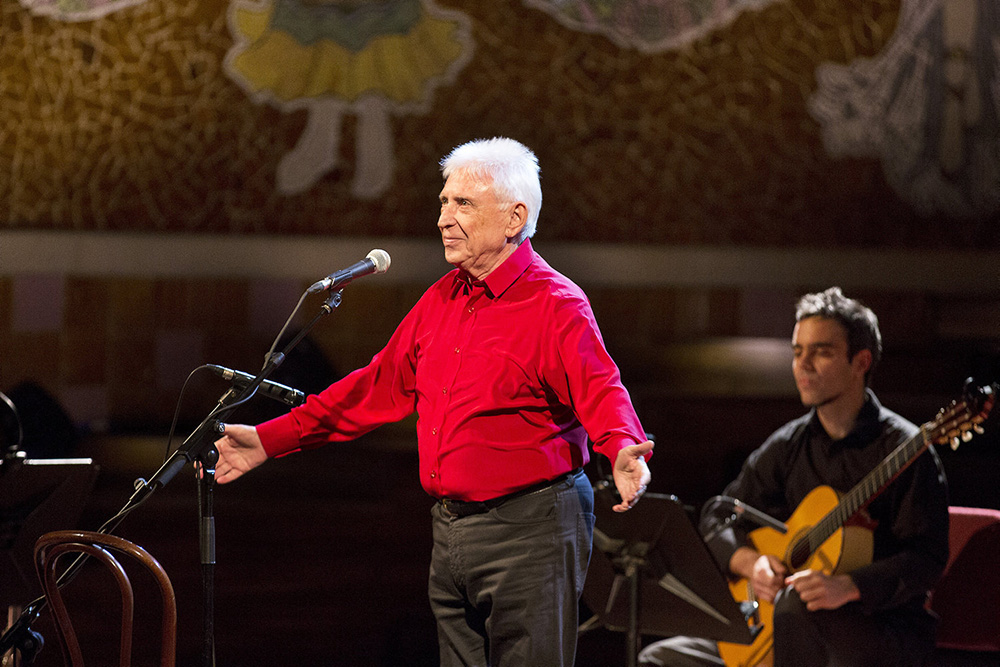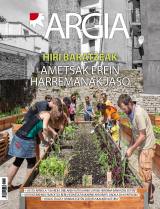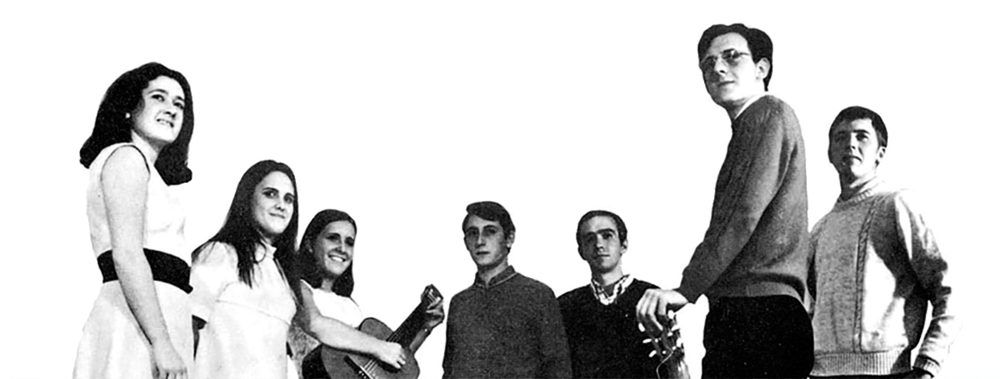So much scream (and some murmur)
- The Valencian musician Raimon has left scenes after more than fifty years of running, with twelve concerts in May at the Palau de la Música de Barcelona. We've had the opportunity to be in the penultimate, and this is the chronicle of what we've lived there.

I'm not going to go into the vices of anybody, but the vices of the ARGIA people are really weird. Ramón Pelegero Sanchis, better known as Raimon (note bene: to put the accent on the last syllable, in no case in the first one that makes us strangers and funny to the ears of the Catalan speakers), will retire, and to see if one day I would go to one of the last concerts (to see if one day I am asked to chronicle a concert by Liberté, Egalité, Beyoné or Beyonder. In total there were twelve concerts, well, all in May, well, but the tickets had run out since the beginning of the year, not so well. I tried it on May 5, and, who knows if someone had to return the entrance (or who knows if someone died), but I could only get one entry (in the chicken house, what will be done), by May 27. For the penultimate concert. Not in the end, I will not be able to tell my grandchildren that I was at Raimon's last concert, but at least I will be able to collect the chronicle, sorry, in writing. Thank you, therefore, to that person who returned the entrance (or who knows if he died).
It's not the first time, of course, that I'm going to a concert by someone I don't particularly like. Well, I don't like it, Raimon didn't follow too much, the truth is I know his hits, how not, but I've always felt like a singer screaming more than singing (and I'm more supportive of the murmur), I've always felt like a singer who didn't know how to sing (and that doesn't have to say anything, look at Fermin Muguruza). This is not the first time, therefore, but this time I am particularly uncomfortable. Perhaps it is because the concert is held in the Palau de la Música omnipotent, a music palace that is now on the front line sadly (of the defendants), for the case of corruption that we all know, the former lehendakari Félix Millet (criminal) becomes curious to read in the interior of the building the last name Millet in more than one place, although he knows that he refers to his great-grandfather Lluis Lluis. And I feel uncomfortable, because for a class struggle or, better, for a complex inferiority, the Palau de la Música is usually occupied by high-class people, those called the Upper Diagonal.
35 songs in total. Palmated for a couple of minutes. And then at home: who shouted so much on the stage has dropped the last to the last, after dropping a 'bona nit i fins sempresas' almost inaudible
But it's because Raimon's too flushed, maybe the people who have the crest a little bit smaller than they think fill the big room today, honest people, law enforcement, mostly in favor of convergence. Curious, moreover, because now it is believed that they are also independentists, and because Raimundo has admitted that he is not independence, while at the same time expressing his doubts about the political process that is believed to live in Catalonia today. To see who dares to give lessons to an icon like Raimon, and the public forgives him that sin, at least he forgets (in the penultimate concert no, fortunately, but in the end people screamed inde-independència; I would like to see the face of poor Raimon). For example, political families (not those of the NCB in Comú, those of women): by chance, having won entries for 27 May, these have gone from tiptoe since December, when I mentioned Raimon's non-independence. There's a star in the room, although it doesn't cover Millet's name.
The concert started when they are the ten just passes (too late for me, because I am already at the door of the first dream, and after Barsa threw the first Goal into the Alavés). And for me -- and I'm afraid for a lot of the audience -- I started with completely unknown songs, far from those old, aggressive, bustling songs, closer to the Neapolitan chanson, a nice surprise. Dressed in red shirt, surrounded by impeccable musicians (two guitars, double bass, clarinet), plays sweet tunes for strong ears. For example, Elogi dels diners, with a 14th-century text, especially acclaimed by the public, driven by not knowing what context. As the songs progressed, a discovery: RAIMON, caramba, sings better than you think, the singer who institutionalized the rooster when singing. Without giving up the barns (small peccata, for which we have a seat in the barn), but closer to the murmur than to the scream. She even dances in some song. In the few words intervals, yes, even if the farewell is a concert. You have breached the rule to present the song País Basc shortly (remember: “Tots els colors del verd, Gora Euskadi criden fort”) to explain, on the one hand, that a trip to Euskal Herria in 1967 touched Ez Dok Amairu, Laboa, Lete, Iriondo, the Artze brothers, and, on the other hand, that people came from Bilbao to the concert (he did not mention Hondarribia). It seemed to me to be one of the songs most applauded by the public (I do not know why, after the PNV-PP agreement, because relations between Catalans and Basques are not at the sweetest moment in history).
I expected him to sing, above all, stories of the era of dictatorship. Another prejudice. One more. I didn't know I had musicated so many Catalan poets, from Ausias Marchengadi to Salvador Espriu. I didn't know I had made a version of I remember Amanda from Victor Jara, Et traveled Amanda. I did not know that the Valencian of Raimundo entered without any problem in the ears of a Catalan Basque. In the visetas, people are even hotter. Jo vinc d’un credito (“Qui perd els origens, perd identitat”, txalo), Diguem no (“Nosaltres no som d’eixe món”, txalo, txalo), composed with his first song, Al vent (“Els ulls al vent, al vent, al món”, applause, applause). 35 songs in total. Palmated for a couple of minutes. Then, obedient, they returned home. All of them are fans of raimons, but above all Catalans.
I guess there will be many ways to end a musical journey of over fifty years. This is the name chosen by Ramón Pelegero Sanchis, a musician best known as Raimon (Oroi accentuation). After 65 years, eleven years ago, the musician born in Xátiva in 1940 has decided to retire. The one who on the stage has cast so much shout (and murmur, OK), has lowered the last without limits, having dropped a bona nit i fins sempresas, a gabon and always an almost inaudible art.
Last year, I met a Braham in Delhi. I was surprised that I loved beer and knew it in Spanish. I would say it would be my oldest, but I was walking with the help of a stick, slowly. To see why he knew Spanish, I asked him and he told me that he learned as a child because he heard... [+]
You know how it goes, right? "Dream txuntxurrun green, dream bite...". It is undoubtedly the most famous crib song in Euskera, and also has Vitoria as its protagonist. After a brief study, I learned that Resurrection Mª de Azkue collected in 1922 three versions of the song in his... [+]
Abenduaren 6an agurtu du pilotaren munduak azaroaren 30ean zendutako azkaindarra. Profesional mailan ezker paretan txapela jantzi zuen Ipar Euskal Herriko lehen pilotaria da: bi txapel jantzi zituen binakako txapelketan, Joxan Tolosarekin.
Gasteizko Oihaneder Euskararen Etxearen Batera proiektuen emaitzetarik bat gauzatu du berrikitan Maider Lasak, Malen Iturrirekin elkarlanean. Ekainean aurkeztu zuten Loa, loa, laguna izeneko ikusgarri performatiboa, ahotsez, gorputzez eta irudiz. Tradiziozko lo-kantak oinarri,... [+]
Bost hamarkada baina gehiagoko ibilbidearekin, Oskarbi taldeak badaki zer den egoera zailetan musikaren eta kulturgintzaren haria elikatzea. Ez Dok Amairuren garaietatik gaurdaino, herri kantak eta sormen propioa izan ditu iturri. Hamabigarren diskoa grabatzen ari dira, dozena... [+]
Artzain izan nahi zuen txikitatik, eta artzantzaz bizi da duela hogei urtetik hona. Kantuan aritzea gustuko du eta kantuan ari da etxean bezala plazaz plaza. Ez omen da bizitza idilikoa berea, baina ez omen litzateke beste inon eta beste ezertan zoriontsuago izanen. Urepeleko... [+]
























